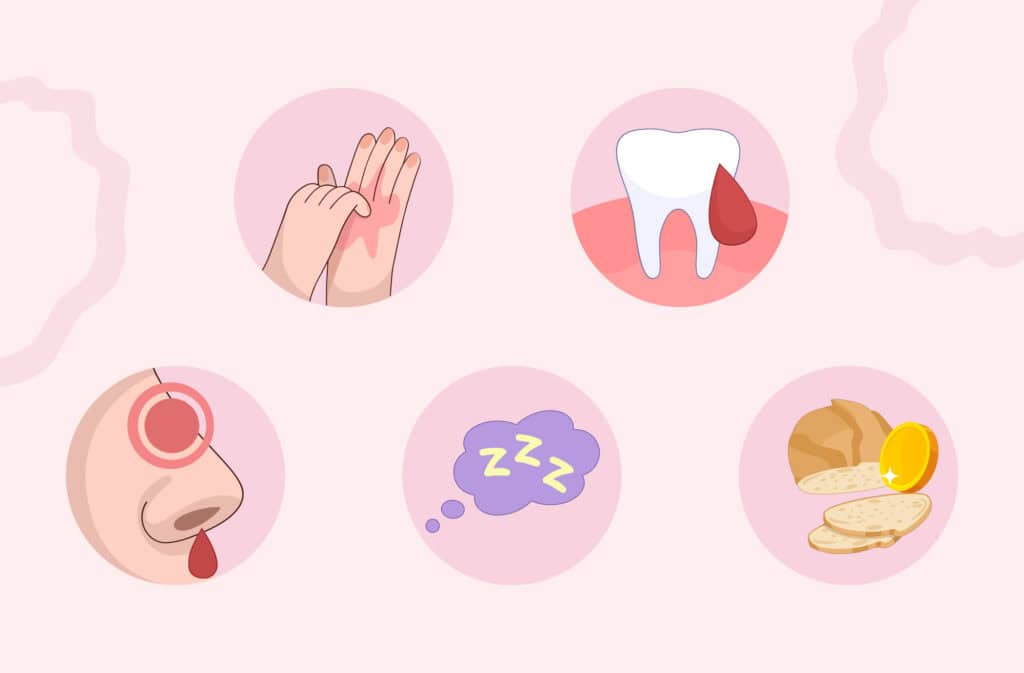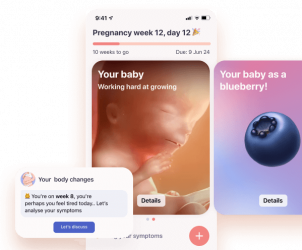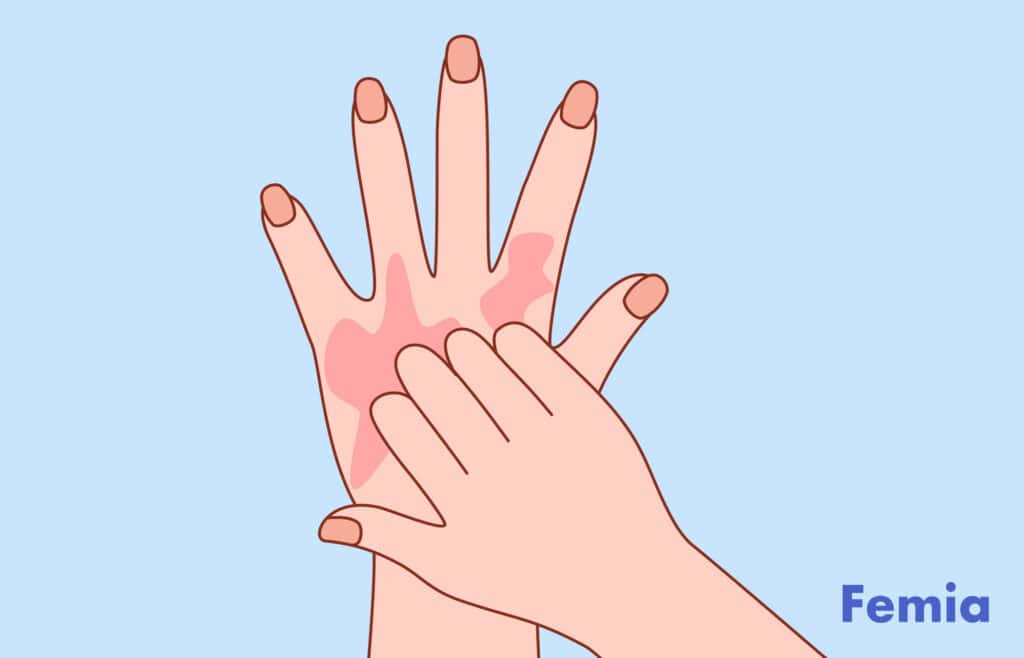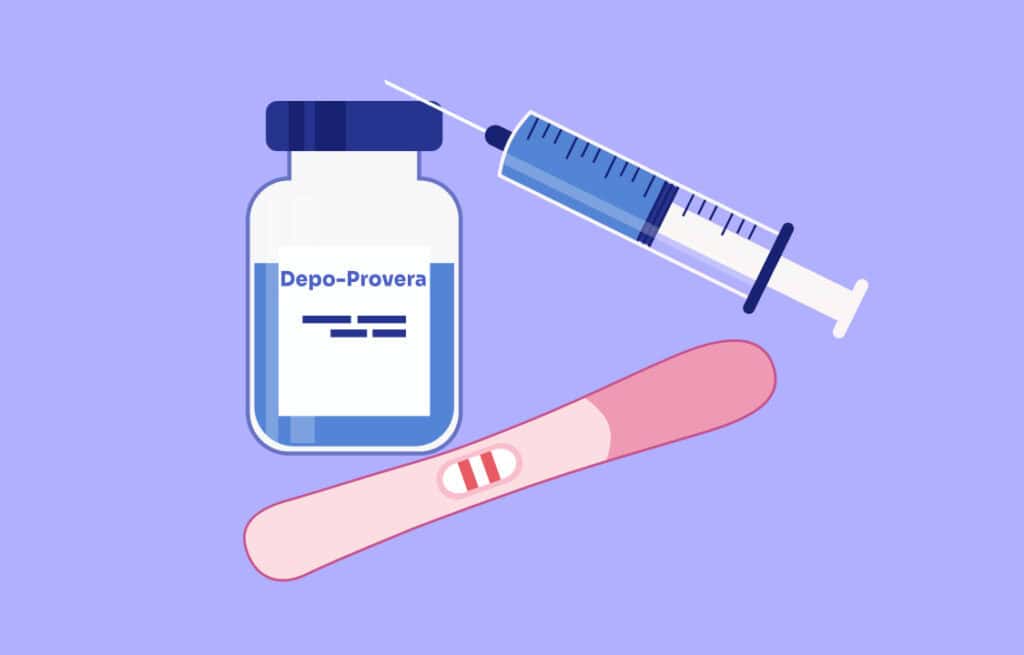Femia > Health Library > Pregnancy > Pregnancy health > 10 weird pregnancy symptoms you didn’t know existed
10 weird pregnancy symptoms you didn’t know existed

- Updated Mar 2, 2025
- Published
CRAFTED BY HUMAN
Crafted by human At Femia, we provide accurate and up-to-date information at every stage of your journey, from trying to conceive, pregnancy and postnatal support. All content is created by a real person based on in-depth research and own professional experience. Femia ensures that you will receive expert advice, strict accuracy and a personalized approach from our authors/medical experts. Learn more about our editorial policy.
FACT CHECKED
Fact checked At Femia Health, we maintain the highest standards of editorial excellence in delivering content focused on helping you conceive, guiding you through pregnancy, and supporting you postpartum. Explore our content review principles to learn how we ensure the accuracy and quality of our health and lifestyle tips for every stage of your journey.
Pregnancy comes with many symptoms that might surprise you. Some women may experience unusual and unexpected changes like altered taste and smell, producing more saliva, nasal congestion, nosebleeds, sensitive and bleeding gums, itchy skin and rashes, or a dark line on the belly.
There is usually no reason to worry, since these weird symptoms of pregnancy are quite common and absolutely normal. However, any intense and uncomfortable symptoms deserve medical attention.
Everybody knows about morning sickness and leg swellings during pregnancy, but what about the more unusual pregnancy symptoms? While expecting, many unexpected symptoms might come your way.
Unusual pregnancy symptoms might be surprising or even concerning at first, but all of the weird signs of pregnancy we’ll discuss in this article are, in fact, perfectly normal and experienced by many pregnant women.
However, although normal and temporary, we know that understanding and recognizing the symptoms you might experience is key to feeling prepared and calm during your pregnancy journey. So, let’s break down these changes and help you understand how to manage them better.
Weird pregnancy symptoms you didn't know existed
Pregnant women are tired, nauseous, and emotional? Yes, but there is much more to uncover. Let’s dive in.
1. Metallic taste in the mouth
Changes in your sense of taste, also known as dysgeusia, is one of the less talked about changes your body goes through while expecting. You might start hating foods that you usually enjoy and liking foods you typically wouldn’t eat. To make things weirder, you might experience a metallic or sour taste in your mouth, even if you are not eating at all.
Scientists are not sure why this happens. Possible causes might be your sex hormones going wild, consuming more calories and salt than usual, or changing levels of minerals and vitamins.
Scientists are not sure why this happens, but there are a few possible causes:
- Hormonal changes. Increased levels of hormones like estrogen and progesterone can affect your taste receptors, leading to a metallic taste.
- Changes in diet and vitamin intake. Taking prenatal vitamins, which contain iron or other metals, can cause a metallic taste.
- Gestational diabetes. Some women develop gestational diabetes, which can influence taste sensations.
It’s important to discuss any persistent or unusual symptoms with your healthcare provider to rule out any underlying conditions.
What can you do about it?
- First of all, don’t worry. Dysgeusia is perfectly normal during pregnancy and usually happens at the beginning of the pregnancy. Your taste will most likely go back to normal after giving birth.
- Avoid foods that bother you. Eat what you can while trying to keep your diet diverse.
- Fight the metallic taste with citrus juices such as lemonade.
- Brush your teeth and tongue regularly. Using a bit of salt might help, too.

@femia.fertility We can help you create a fertility plan based on your needs and health condition. Just check the link in bio. A structured, step-by-step plan can help you feel more in control and less frustrated. You're not alone on your journey ❤️ #ttc #ttccommunity #ttcjourney #ttcover30 #motherin30 #pregnancy #dreambaby #fertilityplan #fertilitysupport #inspiration ♬ sad SpongeBob music - michael
2. Excessive salivation
Who knew that pregnancy can come with a bit of drooling? Producing extra saliva during pregnancy, also known as ptyalism, is common during the first trimester.
As with most pregnancy symptoms, excessive salivation is likely caused by changes in your hormones. The reason might also be morning sickness, as women try to swallow less when nauseous, as well as heartburn, smoke, toxins, and other irritants.
What can you do except carry a tissue with you everywhere you go?
- Brush your teeth more often and use mouthwash.
- Take small sips of water frequently.
- Eat smaller but more frequent meals.
- Chew sugarless gum or suck on hard candy to help manage saliva. While this won’t reduce the production of saliva, it will make swallowing easier. Just be sure to choose sugarless options to reduce the risk of cavities and avoid excessive consumption. Pay attention to the ingredients, as some artificial sweeteners or additives in gums and candies can cause allergic reactions or other side effects.
- Suck on ice cubes—it is another trick that can make your mouth numb for a while and pause the secretion of saliva.
👉Find out more: Weird pregnancy cravings: The strangest food combos and how to handle them.
3. Nasal congestion and nosebleeds
Some women feel that their nose is stuffy, congested, and even prone to bleeding during pregnancy. Yet again, changes in the levels of hormones are to blame.
The pregnancy hormone mix, including higher levels of estrogen and progesterone, increases the amount of blood circulating in your body. Estrogen causes the lining of your nose to swell, while progesterone can cause fluid retention, both of which contribute to a stuffy nose. The increased blood volume (by about 30-50%) can also cause the nasal tissues to swell and lead to congestion.
If you experience a nosebleed, pinch your nose under the bridge and lean forward, but also try to sit or stand upright. If the bleeding persists for longer than 10–15 minutes, it is a good idea to go see a healthcare professional.
4. Itchy skin and rashes
Feel the need to scratch? As your pregnancy journey progresses, you might notice some changes in your skin. Don’t worry, as some itchiness and rash are perfectly normal.
Itching might come as the skin of your tummy begins to expand. It might also be the result of changes in the way your immune system works.
Sometimes, itching can also be a symptom of certain pregnancy health conditions or other skin diseases. Many women who have had previous skin conditions experience flare-ups during pregnancy. It is important to talk to your healthcare provider if itching becomes severe, or if you notice other changes to your skin.
There are a few ways to relieve itching during pregnancy:
- Moisturize your skin. Dry skin is more likely to itch, so make sure it is soft and hydrated. Use only pregnancy-safe creams and lotions.
- No hot showers. Use moderately warm or cool water in the shower, as washing your skin with very hot water may cause dryness and irritation.
- Use a mild body wash. Pregnancy-safe body washes should not contain aggressive ingredients, but some soaps can still dry out and irritate the skin. Consider trying an oil-based product.
- Wear loose clothing. No need for clothes pressing onto your sensitive skin at this time, and no rough fabrics.

5. Dark line on the belly
All pregnancy bellies are beautiful, but some might come with a little more pigment. A dark line on the belly, also known as linea nigra, usually runs from the belly button down to the pubic area. It starts as the pale line, also known as linea alba, becomes darker during pregnancy. The dark belly line is never actually black, but brownish. It usually appears around the fifth month of pregnancy and might get darker over time.
As you can guess, it all comes down to spikes in pregnancy hormones. Under the influence of hormones such as estrogen and progesterone, which are produced in much higher concentrations during pregnancy, changes occur in the melanization process (the formation of the pigment melanin). This leads to increased melanin production in the skin, resulting in the darkening of certain areas, including the linea nigra.
Although the exact mechanism is unknown, scientists believe that a hormone created by the placenta may stimulate pigment-producing cells in that area of the skin.
We know this is surely not your favorite body change while expecting, but know that it is perfectly normal. Don’t worry—the color of your tummy will go back to the way it was after giving birth.
👉Find out more: Can you get piercings while pregnant?

6. Changes in body odor
Pregnancy is a time of intense hormonal and metabolic changes. And, where there are hormones and sweat glands, there is also body odor.
When you are pregnant, your blood supply increases to keep your baby nourished and comfy. The extra blood can make you feel very warm and sweaty,especially in areas rich in sweat glands, like the armpit and groin. On top of that, the sex hormones, and particularly estrogens, help you regulate the body temperature and sweat more easily. Some soon-to-be mamas may experience night sweats coupled with more intense body odor.
There is no reason for concern. Proper hygiene can usually help, as well as some pregnancy-safe deodorants. Always remember—all the unexpected changes your body is going through will likely go back to normal quickly after giving birth.
So, don’t be too hard on yourself! Pregnancy not only makes you smell different but also messes with the way your sense of smell works.
👉Find out more: Twin pregnancy belly week by week: What to expect
7. Increased sense of smell
Can you tell what’s cooking even before you’ve entered the kitchen? Does the smell of certain foods turn your stomach? This heightened sense of smell, also known as hyperosmia, is common in pregnancy. Unfortunately, it might make you even more perceptive to the changes in your body odor.
Research shows that up to two-thirds of pregnant women become more sensitive to the scents around them. This often happens during the second and third semesters of pregnancy.
This heightened sense of smell is primarily due to hormonal changes:
- Estrogens. During pregnancy, the levels of estrogen rise significantly. This hormone can enhance receptor sensitivity in the nasal cavities, making smells more pronounced and intense.
- Progestogens. Another important pregnancy hormone, progesterone, can also affect olfactory sensitivity, though its impact is less pronounced compared to estrogen.
This symptom is often considered one of the possible signs of pregnancy, especially in cases where other clinical signs are not yet obvious. This is one of the most likely early signs of pregnancy.
While you can’t prevent your nose from responding to scents, there are a few strategies to try:
- Avoid scents that drive you crazy. Cook and eat only the foods with scents that don’t bother you. Eating cold-served food might make the smell more tolerable.
- Freshen up the air. Open the windows to allow for air to banish cooking or musty odors.
- Wash your clothes more often. Fibers tend to absorb unpleasant odors, so make sure to keep them clean.
- Don’t worry. The superhuman sense of smell will likely go away after giving birth.
8. Bleeding gums
Pregnancy sometimes feels like your body is falling apart. One of these moments may be when your gums start to bleed, even though they usually don’t.
Some pregnant ladies are prone to plaque build-up on the teeth. As a result, they develop swollen and sore gums, which may bleed. This condition is known as pregnancy gingivitis or gum disease.
How should you look after your gums and teeth? Here are a few tips:
- Use fluoride toothpaste. Clean your teeth carefully two or three times per day. Ask your dentist about a good brushing method to remove plaque, as well as a good toothbrush.
- Floss once per day. Get rid of little pieces of food between your teeth and prevent plaque buildup.
- Avoid alcohol-based mouthwash. It may irritate your gums.
- Stay away from sugary drinks and foods. As much as possible, avoid processed snacks and try to stick with your meal times.
- Stop smoking. Chemicals from tobacco can make gum disease worse.
- Monitor your diet. Include plenty of fruits and vegetables that contain vitamin C.
- Drink enough water. Staying hydrated is important for maintaining healthy gums.
⚠️ Important note: If gingivitis is not treated, it can progress to periodontitis, a more serious condition affecting the gums and supporting tissues, which can also lead to bleeding. Bleeding gums can also be a sign of vitamin deficiencies (such as vitamin C) or other conditions like thrombocytopenia (low platelet count) and other systemic diseases. Please discuss any gum bleeding with your healthcare provider to ensure proper care and to address any potential underlying issues.
9. Vivid dreams and nightmares
If you thought that weird pregnancy symptoms include only physical changes, wait until you go to sleep. Some pregnant ladies experience very real, vivid dreams and even nightmares during pregnancy. The cocktail of hormones is playing with your mind, too.
As long as the dreams are not causing you distress or severely disturbing your sleep pattern, there is nothing to be concerned about. Actually, these dreams may help you process your emotions more easily.
Here are a few tips for dealing with pregnancy dreams:
- Keep a journal of your dreams. This might help you understand patterns better and prevent nightmares from keeping you awake.
- Try calming techniques such as meditation or yoga.
- If you cannot sleep, talk to your healthcare provider or therapist. You might be experiencing underlying problems or stressors.
👉Find out more: Orgasms during pregnancy: Your questions and concerns answered

10. Clumsiness
This one is the least talked about strange symptoms of pregnancy, but surely one that makes sense. Pregnancy is associated with poor coordination and balance—or simply, clumsiness.
As your bump keeps getting bigger, you might feel more uncoordinated and likely to drop things. The reason for this is the extra weight you are carrying, which changes your center of gravity. Muscle control and coordination decline, and joints loosen up because of pregnancy hormones. Along with these symptoms, you might also experience back pain and overall tiredness.
All of these factors increase your chances of having a fall during pregnancy, especially during the last semester. Take it easy, slow down, and be especially careful when walking on wet, icy, or uneven surfaces.
When to seek medical advice
Most of the unusual pregnancy symptoms we mentioned are benign and perfectly normal during pregnancy. However, if you feel like any of them become overly intense and cause significant discomfort, make sure to talk with your healthcare provider.
For instance, severe itching and rash can be a sign of more serious skin diseases. Some of these conditions may be harmless for the baby, while others can actually cause health concerns.
It is important to attend regular prenatal visits to monitor the health of your baby and yourself. This will also be the perfect opportunity to discuss any concerns or symptoms with your healthcare provider.
The bottom line
Weird signs of pregnancy may really surprise you! While expecting, many women experience taste and smell differently, produce more saliva, and develop nasal congestion, nosebleeds, bleeding gums, itchy skin, or a dark line on the belly. Using a pregnancy symptoms tracking app can help you log and monitor unusual changes. You may also struggle with very vivid and sometimes unpleasant dreams, as well as overall clumsiness and loss of coordination.
Although these rare pregnancy symptoms can be annoying and unpleasant, there are strategies to fight them. They are also temporary and will completely disappear after you are no longer pregnant. To cope with these unusual symptoms of pregnancy, try to focus on all the more wonderful aspects that come with it. Consult your healthcare provider if any change becomes troubling or too intense.
References
- Agbor Epse Muluh, Elizabeth, et al. “Gustatory and Olfactory Shifts during Pregnancy and the Postpartum Period: A Systematic Review and Meta-Analysis.” Physiology & Behavior, vol. 273, Jan. 2024, p. 114388. ScienceDirect, https://doi.org/10.1016/j.physbeh.2023.114388.
- “Bleeding Gums in Pregnancy.” Nhs.Uk, 3 Dec. 2020, https://www.nhs.uk/pregnancy/related-conditions/common-symptoms/bleeding-gums/.
- Cameron, E. Leslie. “Measures of Human Olfactory Perception during Pregnancy.” Chemical Senses, vol. 32, no. 8, Oct. 2007, pp. 775–82. PubMed, https://doi.org/10.1093/chemse/bjm045.
- “Excessive Saliva in Pregnancy.” National Childbirth Trust, 11 July 2019, https://www.nct.org.uk/pregnancy/worries-and-discomforts/common-discomforts/excessive-saliva-pregnancy.
- Jones, Samantha Vaughan, et al. “Skin Disease in Pregnancy.” BMJ, vol. 348, June 2014, p. g3489. www.bmj.com, https://doi.org/10.1136/bmj.g3489.
- Kuga, Mutsumi, et al. “Changes in Gustatory Sense During Pregnancy.” Acta Oto-Laryngologica, vol. 122, no. 4, Jan. 2002, pp. 146–53. Taylor and Francis+NEJM, https://doi.org/10.1080/00016480260046544.
- Lara-Carrasco, Jessica, et al. “Disturbed Dreaming during the Third Trimester of Pregnancy.” Sleep Medicine, vol. 15, no. 6, June 2014, pp. 694–700. ScienceDirect, https://doi.org/10.1016/j.sleep.2014.01.026.
- “Linea Nigra: What to Know about the Pregnancy Line.” University Health, https://www.universityhealthkc.org/health-library/story/0cb72a7f-ca5d-42b1-98fe-9ff37893a824. Accessed 9 July 2024.
- National Childbirth Trust. “Nosebleeds during Pregnancy.” NCT (National Childbirth Trust), 18 Aug. 2022, https://www.nct.org.uk/pregnancy/worries-and-discomforts/common-discomforts/nosebleeds-during-pregnancy.
Musaei, Sadigheh. “The Effect of Pregnancy on the Skin.” Eurasian Journal of Chemical, Medicinal and Petroleum Research, vol. 2, no. 1, Sept. 2022, pp. 17–23. www.ejcmpr.com, https://doi.org/10.5281/zenodo.7353400.

Twin pregnancy week-by-week: belly size, body changes, and development of twins in the womb. Understand how your babies grow week by week with images.

Learn the ultimate guide to female orgasm with the orgasm tips, tricks, techniques, and do’s and don’ts to achieve the most satisfying sex experience!

Learn about the signs of pregnancy after Depo-Provera, how long it takes to get pregnant, and tips for conceiving after stopping the birth control shot.

